PHI 101: Analysis of John Lennox's Arguments in God Debate
VerifiedAdded on 2022/09/14
|5
|1554
|17
Report
AI Summary
This report provides a comprehensive analysis of the debate between Professor John Lennox and Professor Richard Dawkins concerning the existence of God, focusing on Lennox's arguments. The analysis employs cosmological and ontological theories to evaluate Lennox's philosophical content. The report highlights the strengths of Lennox's arguments, such as his responses to Dawkins's scientific and moral claims, and his use of philosophical content to address the origin of life. It also identifies weaknesses, including instances where Lennox's responses failed to logically defend his positions on morality and the resurrection of Jesus Christ. The report references the debate's key points, including Dawkins's arguments about the Bible and the role of science, and Lennox's counterarguments regarding atheism and the need for a rational basis for scientific study. The analysis concludes with an assessment of Lennox's overall philosophical approach and its effectiveness in the debate.
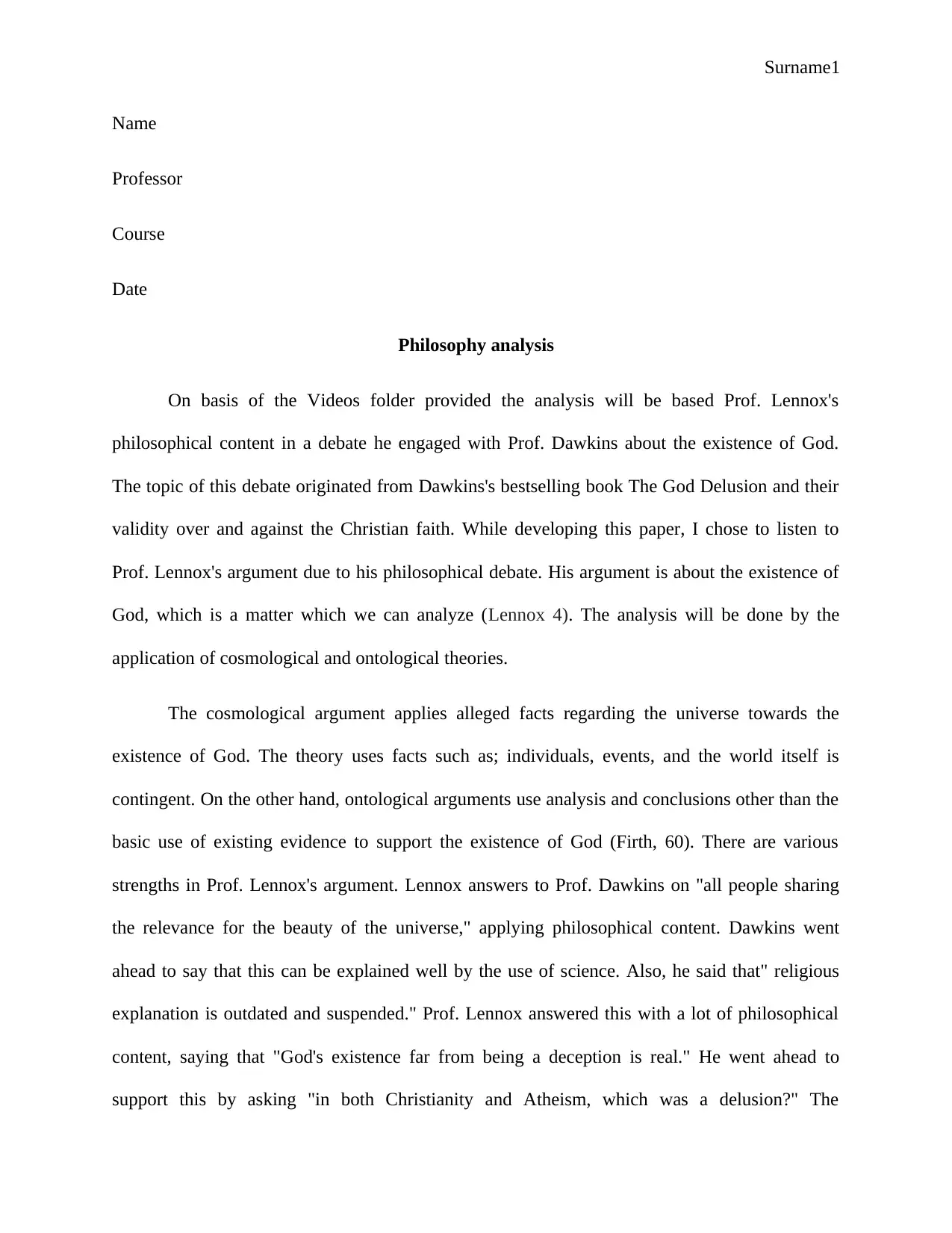
Surname1
Name
Professor
Course
Date
Philosophy analysis
On basis of the Videos folder provided the analysis will be based Prof. Lennox's
philosophical content in a debate he engaged with Prof. Dawkins about the existence of God.
The topic of this debate originated from Dawkins's bestselling book The God Delusion and their
validity over and against the Christian faith. While developing this paper, I chose to listen to
Prof. Lennox's argument due to his philosophical debate. His argument is about the existence of
God, which is a matter which we can analyze (Lennox 4). The analysis will be done by the
application of cosmological and ontological theories.
The cosmological argument applies alleged facts regarding the universe towards the
existence of God. The theory uses facts such as; individuals, events, and the world itself is
contingent. On the other hand, ontological arguments use analysis and conclusions other than the
basic use of existing evidence to support the existence of God (Firth, 60). There are various
strengths in Prof. Lennox's argument. Lennox answers to Prof. Dawkins on "all people sharing
the relevance for the beauty of the universe," applying philosophical content. Dawkins went
ahead to say that this can be explained well by the use of science. Also, he said that" religious
explanation is outdated and suspended." Prof. Lennox answered this with a lot of philosophical
content, saying that "God's existence far from being a deception is real." He went ahead to
support this by asking "in both Christianity and Atheism, which was a delusion?" The
Name
Professor
Course
Date
Philosophy analysis
On basis of the Videos folder provided the analysis will be based Prof. Lennox's
philosophical content in a debate he engaged with Prof. Dawkins about the existence of God.
The topic of this debate originated from Dawkins's bestselling book The God Delusion and their
validity over and against the Christian faith. While developing this paper, I chose to listen to
Prof. Lennox's argument due to his philosophical debate. His argument is about the existence of
God, which is a matter which we can analyze (Lennox 4). The analysis will be done by the
application of cosmological and ontological theories.
The cosmological argument applies alleged facts regarding the universe towards the
existence of God. The theory uses facts such as; individuals, events, and the world itself is
contingent. On the other hand, ontological arguments use analysis and conclusions other than the
basic use of existing evidence to support the existence of God (Firth, 60). There are various
strengths in Prof. Lennox's argument. Lennox answers to Prof. Dawkins on "all people sharing
the relevance for the beauty of the universe," applying philosophical content. Dawkins went
ahead to say that this can be explained well by the use of science. Also, he said that" religious
explanation is outdated and suspended." Prof. Lennox answered this with a lot of philosophical
content, saying that "God's existence far from being a deception is real." He went ahead to
support this by asking "in both Christianity and Atheism, which was a delusion?" The
Paraphrase This Document
Need a fresh take? Get an instant paraphrase of this document with our AI Paraphraser
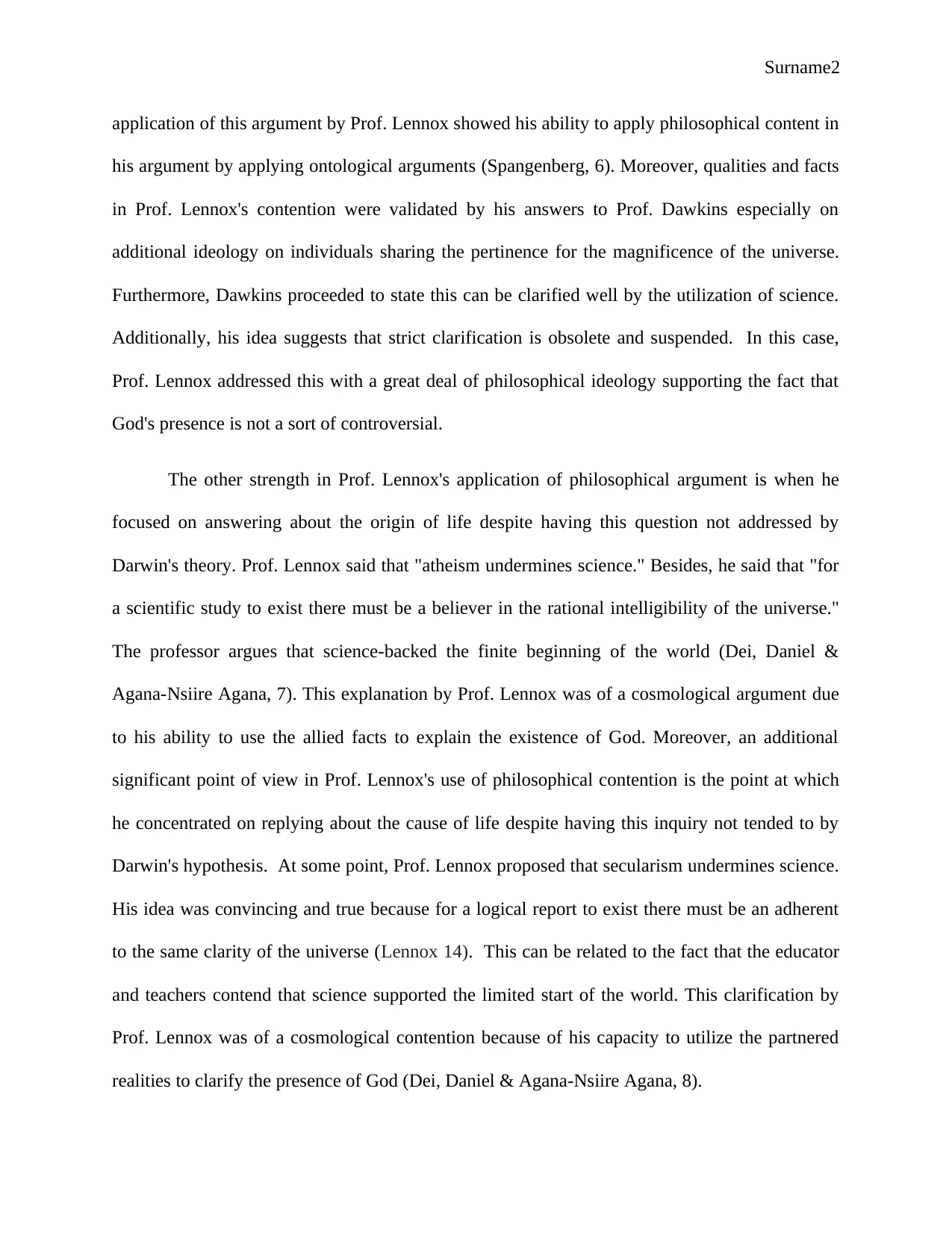
Surname2
application of this argument by Prof. Lennox showed his ability to apply philosophical content in
his argument by applying ontological arguments (Spangenberg, 6). Moreover, qualities and facts
in Prof. Lennox's contention were validated by his answers to Prof. Dawkins especially on
additional ideology on individuals sharing the pertinence for the magnificence of the universe.
Furthermore, Dawkins proceeded to state this can be clarified well by the utilization of science.
Additionally, his idea suggests that strict clarification is obsolete and suspended. In this case,
Prof. Lennox addressed this with a great deal of philosophical ideology supporting the fact that
God's presence is not a sort of controversial.
The other strength in Prof. Lennox's application of philosophical argument is when he
focused on answering about the origin of life despite having this question not addressed by
Darwin's theory. Prof. Lennox said that "atheism undermines science." Besides, he said that "for
a scientific study to exist there must be a believer in the rational intelligibility of the universe."
The professor argues that science-backed the finite beginning of the world (Dei, Daniel &
Agana-Nsiire Agana, 7). This explanation by Prof. Lennox was of a cosmological argument due
to his ability to use the allied facts to explain the existence of God. Moreover, an additional
significant point of view in Prof. Lennox's use of philosophical contention is the point at which
he concentrated on replying about the cause of life despite having this inquiry not tended to by
Darwin's hypothesis. At some point, Prof. Lennox proposed that secularism undermines science.
His idea was convincing and true because for a logical report to exist there must be an adherent
to the same clarity of the universe (Lennox 14). This can be related to the fact that the educator
and teachers contend that science supported the limited start of the world. This clarification by
Prof. Lennox was of a cosmological contention because of his capacity to utilize the partnered
realities to clarify the presence of God (Dei, Daniel & Agana-Nsiire Agana, 8).
application of this argument by Prof. Lennox showed his ability to apply philosophical content in
his argument by applying ontological arguments (Spangenberg, 6). Moreover, qualities and facts
in Prof. Lennox's contention were validated by his answers to Prof. Dawkins especially on
additional ideology on individuals sharing the pertinence for the magnificence of the universe.
Furthermore, Dawkins proceeded to state this can be clarified well by the utilization of science.
Additionally, his idea suggests that strict clarification is obsolete and suspended. In this case,
Prof. Lennox addressed this with a great deal of philosophical ideology supporting the fact that
God's presence is not a sort of controversial.
The other strength in Prof. Lennox's application of philosophical argument is when he
focused on answering about the origin of life despite having this question not addressed by
Darwin's theory. Prof. Lennox said that "atheism undermines science." Besides, he said that "for
a scientific study to exist there must be a believer in the rational intelligibility of the universe."
The professor argues that science-backed the finite beginning of the world (Dei, Daniel &
Agana-Nsiire Agana, 7). This explanation by Prof. Lennox was of a cosmological argument due
to his ability to use the allied facts to explain the existence of God. Moreover, an additional
significant point of view in Prof. Lennox's use of philosophical contention is the point at which
he concentrated on replying about the cause of life despite having this inquiry not tended to by
Darwin's hypothesis. At some point, Prof. Lennox proposed that secularism undermines science.
His idea was convincing and true because for a logical report to exist there must be an adherent
to the same clarity of the universe (Lennox 14). This can be related to the fact that the educator
and teachers contend that science supported the limited start of the world. This clarification by
Prof. Lennox was of a cosmological contention because of his capacity to utilize the partnered
realities to clarify the presence of God (Dei, Daniel & Agana-Nsiire Agana, 8).
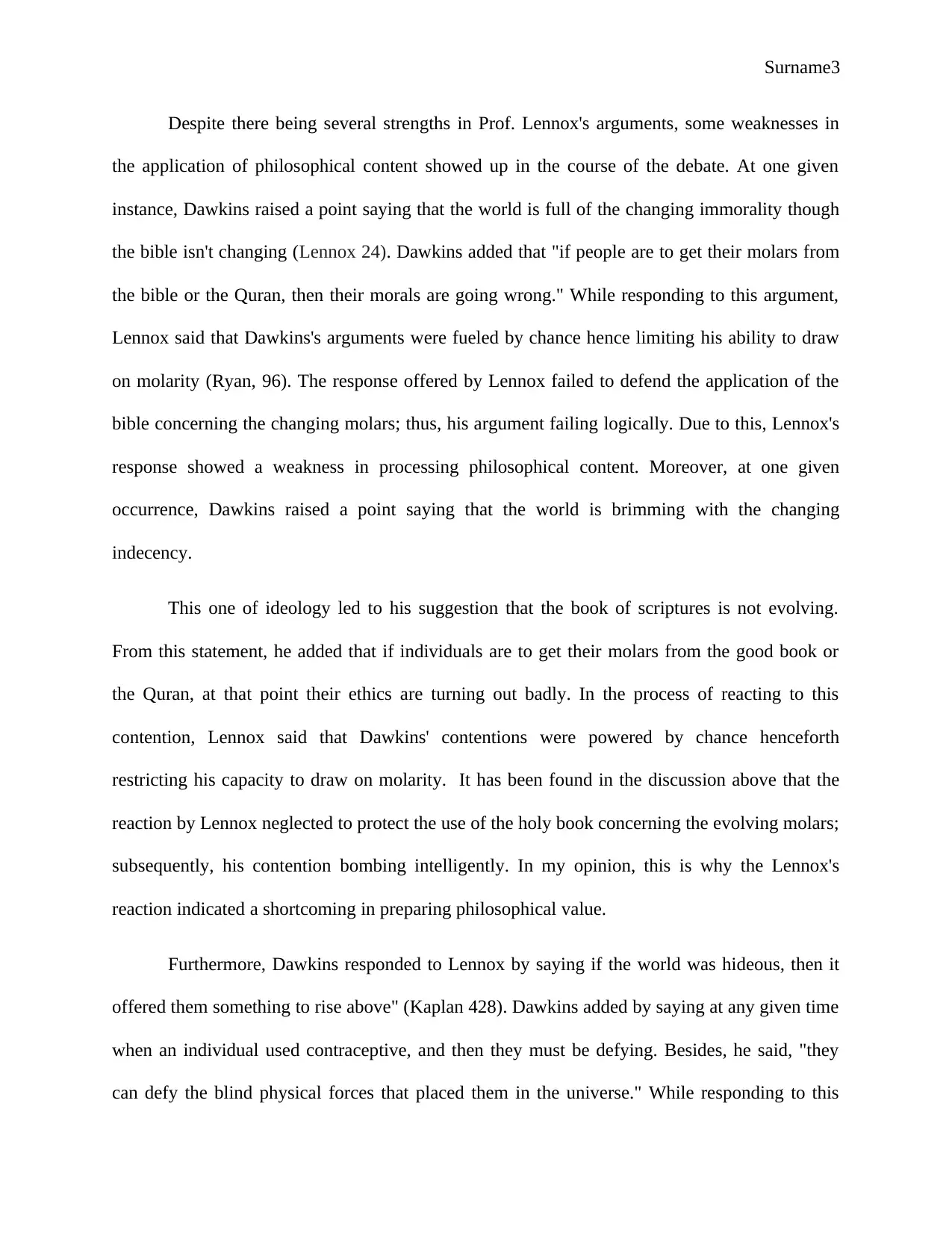
Surname3
Despite there being several strengths in Prof. Lennox's arguments, some weaknesses in
the application of philosophical content showed up in the course of the debate. At one given
instance, Dawkins raised a point saying that the world is full of the changing immorality though
the bible isn't changing (Lennox 24). Dawkins added that "if people are to get their molars from
the bible or the Quran, then their morals are going wrong." While responding to this argument,
Lennox said that Dawkins's arguments were fueled by chance hence limiting his ability to draw
on molarity (Ryan, 96). The response offered by Lennox failed to defend the application of the
bible concerning the changing molars; thus, his argument failing logically. Due to this, Lennox's
response showed a weakness in processing philosophical content. Moreover, at one given
occurrence, Dawkins raised a point saying that the world is brimming with the changing
indecency.
This one of ideology led to his suggestion that the book of scriptures is not evolving.
From this statement, he added that if individuals are to get their molars from the good book or
the Quran, at that point their ethics are turning out badly. In the process of reacting to this
contention, Lennox said that Dawkins' contentions were powered by chance henceforth
restricting his capacity to draw on molarity. It has been found in the discussion above that the
reaction by Lennox neglected to protect the use of the holy book concerning the evolving molars;
subsequently, his contention bombing intelligently. In my opinion, this is why the Lennox's
reaction indicated a shortcoming in preparing philosophical value.
Furthermore, Dawkins responded to Lennox by saying if the world was hideous, then it
offered them something to rise above" (Kaplan 428). Dawkins added by saying at any given time
when an individual used contraceptive, and then they must be defying. Besides, he said, "they
can defy the blind physical forces that placed them in the universe." While responding to this
Despite there being several strengths in Prof. Lennox's arguments, some weaknesses in
the application of philosophical content showed up in the course of the debate. At one given
instance, Dawkins raised a point saying that the world is full of the changing immorality though
the bible isn't changing (Lennox 24). Dawkins added that "if people are to get their molars from
the bible or the Quran, then their morals are going wrong." While responding to this argument,
Lennox said that Dawkins's arguments were fueled by chance hence limiting his ability to draw
on molarity (Ryan, 96). The response offered by Lennox failed to defend the application of the
bible concerning the changing molars; thus, his argument failing logically. Due to this, Lennox's
response showed a weakness in processing philosophical content. Moreover, at one given
occurrence, Dawkins raised a point saying that the world is brimming with the changing
indecency.
This one of ideology led to his suggestion that the book of scriptures is not evolving.
From this statement, he added that if individuals are to get their molars from the good book or
the Quran, at that point their ethics are turning out badly. In the process of reacting to this
contention, Lennox said that Dawkins' contentions were powered by chance henceforth
restricting his capacity to draw on molarity. It has been found in the discussion above that the
reaction by Lennox neglected to protect the use of the holy book concerning the evolving molars;
subsequently, his contention bombing intelligently. In my opinion, this is why the Lennox's
reaction indicated a shortcoming in preparing philosophical value.
Furthermore, Dawkins responded to Lennox by saying if the world was hideous, then it
offered them something to rise above" (Kaplan 428). Dawkins added by saying at any given time
when an individual used contraceptive, and then they must be defying. Besides, he said, "they
can defy the blind physical forces that placed them in the universe." While responding to this
⊘ This is a preview!⊘
Do you want full access?
Subscribe today to unlock all pages.

Trusted by 1+ million students worldwide
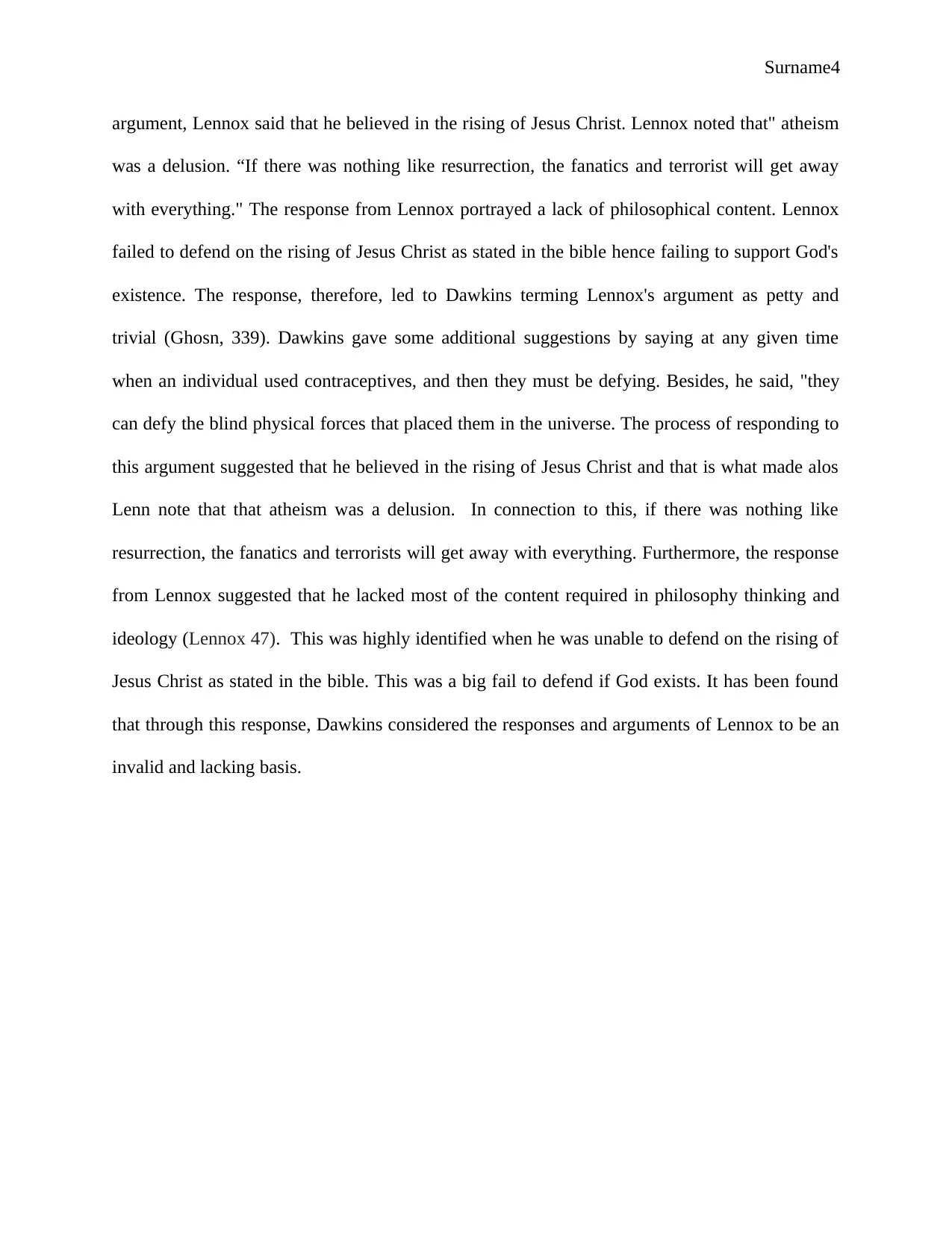
Surname4
argument, Lennox said that he believed in the rising of Jesus Christ. Lennox noted that" atheism
was a delusion. “If there was nothing like resurrection, the fanatics and terrorist will get away
with everything." The response from Lennox portrayed a lack of philosophical content. Lennox
failed to defend on the rising of Jesus Christ as stated in the bible hence failing to support God's
existence. The response, therefore, led to Dawkins terming Lennox's argument as petty and
trivial (Ghosn, 339). Dawkins gave some additional suggestions by saying at any given time
when an individual used contraceptives, and then they must be defying. Besides, he said, "they
can defy the blind physical forces that placed them in the universe. The process of responding to
this argument suggested that he believed in the rising of Jesus Christ and that is what made alos
Lenn note that that atheism was a delusion. In connection to this, if there was nothing like
resurrection, the fanatics and terrorists will get away with everything. Furthermore, the response
from Lennox suggested that he lacked most of the content required in philosophy thinking and
ideology (Lennox 47). This was highly identified when he was unable to defend on the rising of
Jesus Christ as stated in the bible. This was a big fail to defend if God exists. It has been found
that through this response, Dawkins considered the responses and arguments of Lennox to be an
invalid and lacking basis.
argument, Lennox said that he believed in the rising of Jesus Christ. Lennox noted that" atheism
was a delusion. “If there was nothing like resurrection, the fanatics and terrorist will get away
with everything." The response from Lennox portrayed a lack of philosophical content. Lennox
failed to defend on the rising of Jesus Christ as stated in the bible hence failing to support God's
existence. The response, therefore, led to Dawkins terming Lennox's argument as petty and
trivial (Ghosn, 339). Dawkins gave some additional suggestions by saying at any given time
when an individual used contraceptives, and then they must be defying. Besides, he said, "they
can defy the blind physical forces that placed them in the universe. The process of responding to
this argument suggested that he believed in the rising of Jesus Christ and that is what made alos
Lenn note that that atheism was a delusion. In connection to this, if there was nothing like
resurrection, the fanatics and terrorists will get away with everything. Furthermore, the response
from Lennox suggested that he lacked most of the content required in philosophy thinking and
ideology (Lennox 47). This was highly identified when he was unable to defend on the rising of
Jesus Christ as stated in the bible. This was a big fail to defend if God exists. It has been found
that through this response, Dawkins considered the responses and arguments of Lennox to be an
invalid and lacking basis.
Paraphrase This Document
Need a fresh take? Get an instant paraphrase of this document with our AI Paraphraser
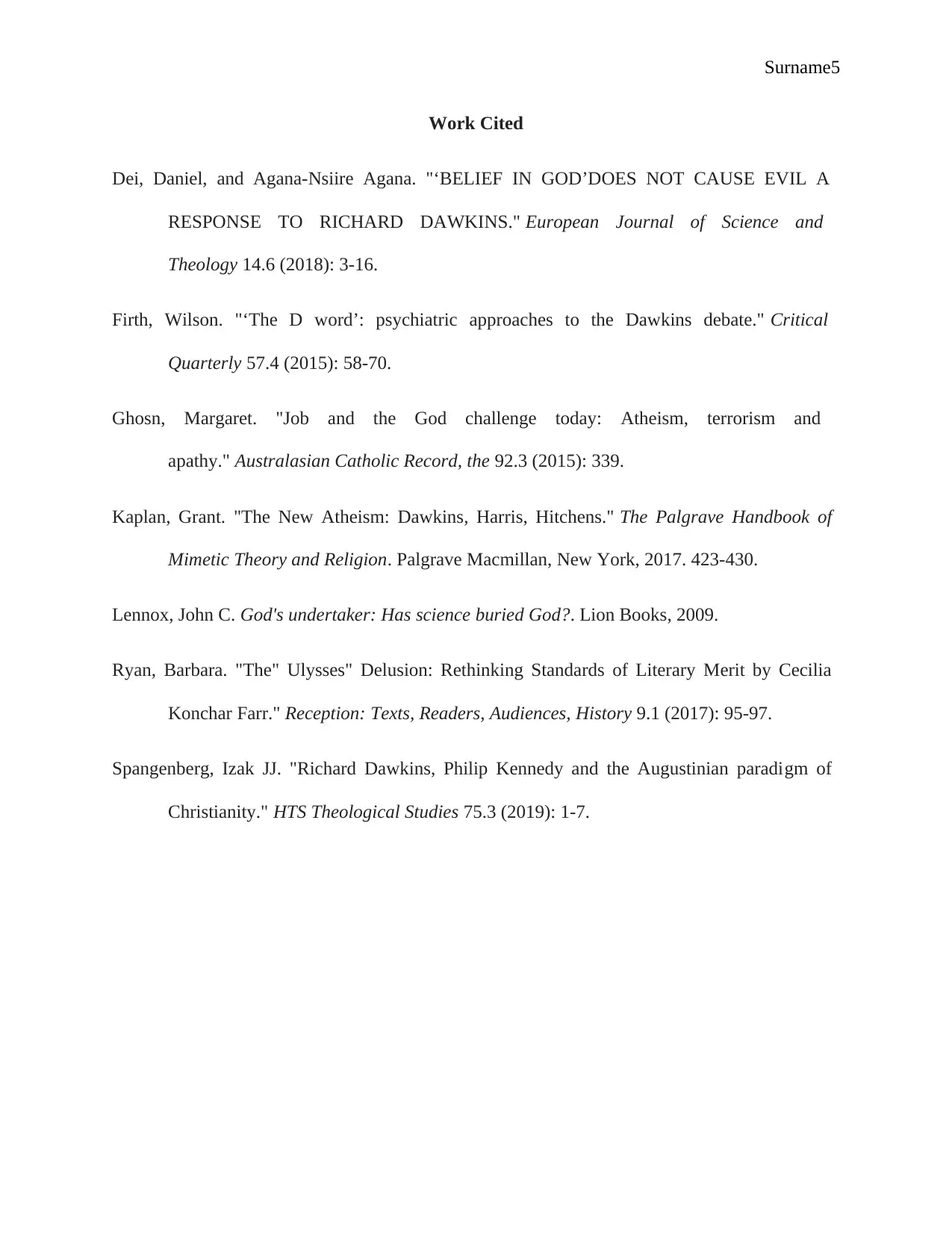
Surname5
Work Cited
Dei, Daniel, and Agana-Nsiire Agana. "‘BELIEF IN GOD’DOES NOT CAUSE EVIL A
RESPONSE TO RICHARD DAWKINS." European Journal of Science and
Theology 14.6 (2018): 3-16.
Firth, Wilson. "‘The D word’: psychiatric approaches to the Dawkins debate." Critical
Quarterly 57.4 (2015): 58-70.
Ghosn, Margaret. "Job and the God challenge today: Atheism, terrorism and
apathy." Australasian Catholic Record, the 92.3 (2015): 339.
Kaplan, Grant. "The New Atheism: Dawkins, Harris, Hitchens." The Palgrave Handbook of
Mimetic Theory and Religion. Palgrave Macmillan, New York, 2017. 423-430.
Lennox, John C. God's undertaker: Has science buried God?. Lion Books, 2009.
Ryan, Barbara. "The" Ulysses" Delusion: Rethinking Standards of Literary Merit by Cecilia
Konchar Farr." Reception: Texts, Readers, Audiences, History 9.1 (2017): 95-97.
Spangenberg, Izak JJ. "Richard Dawkins, Philip Kennedy and the Augustinian paradigm of
Christianity." HTS Theological Studies 75.3 (2019): 1-7.
Work Cited
Dei, Daniel, and Agana-Nsiire Agana. "‘BELIEF IN GOD’DOES NOT CAUSE EVIL A
RESPONSE TO RICHARD DAWKINS." European Journal of Science and
Theology 14.6 (2018): 3-16.
Firth, Wilson. "‘The D word’: psychiatric approaches to the Dawkins debate." Critical
Quarterly 57.4 (2015): 58-70.
Ghosn, Margaret. "Job and the God challenge today: Atheism, terrorism and
apathy." Australasian Catholic Record, the 92.3 (2015): 339.
Kaplan, Grant. "The New Atheism: Dawkins, Harris, Hitchens." The Palgrave Handbook of
Mimetic Theory and Religion. Palgrave Macmillan, New York, 2017. 423-430.
Lennox, John C. God's undertaker: Has science buried God?. Lion Books, 2009.
Ryan, Barbara. "The" Ulysses" Delusion: Rethinking Standards of Literary Merit by Cecilia
Konchar Farr." Reception: Texts, Readers, Audiences, History 9.1 (2017): 95-97.
Spangenberg, Izak JJ. "Richard Dawkins, Philip Kennedy and the Augustinian paradigm of
Christianity." HTS Theological Studies 75.3 (2019): 1-7.
1 out of 5
Your All-in-One AI-Powered Toolkit for Academic Success.
+13062052269
info@desklib.com
Available 24*7 on WhatsApp / Email
![[object Object]](/_next/static/media/star-bottom.7253800d.svg)
Unlock your academic potential
Copyright © 2020–2025 A2Z Services. All Rights Reserved. Developed and managed by ZUCOL.

